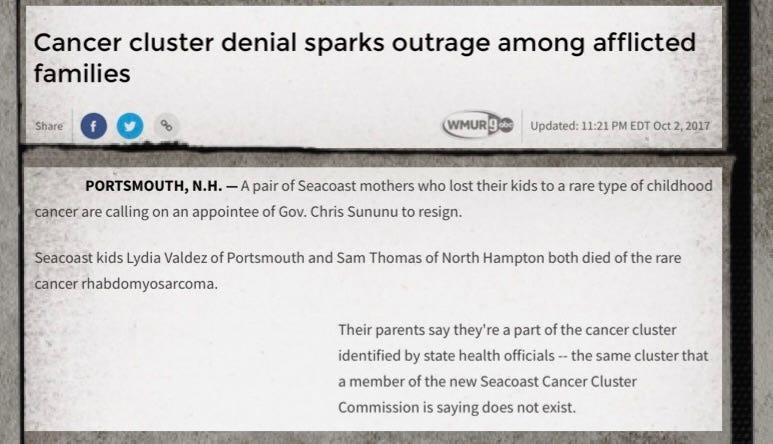Truth in the Face of Political Adversity
Addressing Childhood Cancer and Environmental Health
This month marked the conclusion of the work undertaken by two commissions dedicated to addressing the high rates of environmentally triggered cancer and chronic illness in New Hampshire. These commissions have focused on identifying and mitigating the environmental factors contributing to these health issues, aiming to implement effective strategies for public health improvement across the state. Both commissions have been reestablished and will continue their vital efforts to reduce chronic illness by identifying and preventing exposure to arsenic, cyanobacteria, radon, lead, and per- and polyfluoroalkyl substances (PFAS) throughout the state. For more information about these commissions, please see #1 and #2 below.
To provide context, in 2014, the author reported a high incidence of pediatric cancers in their community. It took two years for the state to confirm the findings in 2016, which indicated a significantly higher-than-expected incidence of rare childhood cancers in five seacoast New Hampshire towns. Families have been grappling with the devastating cases of rhabdomyosarcoma and pleuropulmonary blastoma affecting their children, two extremely rare cancers (see #3 below).
After being elected to the New Hampshire House of Representatives in November 2016, one of my first initiatives was House Bill 484, which established a commission to track and assess factors that may be contributing to the high childhood cancer rates in the seacoast region of New Hampshire.
The work of the Commission was mired in controversy due to Governor appointees who disregarded the facts and evidence, causing distress among seacoast families who had lost children to these rare cancers.
In 2018, the Centers for Disease Control and Prevention (CDC) reported that New Hampshire had the highest rate of childhood cancers in the nation, highlighting the urgency of addressing this critical issue.
Meanwhile, PFAS were found to be widespread in public water systems and private wells in densely populated areas along the seacoast, including Portsmouth, North Hampton, Hampton, Newington, Rye, and Greenland, as well as in southern New Hampshire, such as Merrimack, Litchfield, and Bedford. This raised concerns about widespread public exposure to cancer-causing PFAS chemicals.
In response, Senator Jeanne Shaheen called for an investigation, and Governor Sununu echoed these concerns. In his inaugural address in January 2019, the Governor announced that a study would be commissioned to investigate the incidence of cancer in the state, with $500,000 allocated to Dartmouth for this research.
I was overjoyed by the prospect of a commitment to study childhood cancers. However, my hopes were dashed when, at a Martin Luther King Day breakfast celebration in Portsmouth, I thanked the Governor for his commitment, and he responded with “We don’t have a problem with pediatric cancer in New Hampshire.” His statement contradicted the facts and left me concerned that the conclusion of the Dartmouth study had already been predetermined.
My fears were confirmed when significant concerns about the methodologies used in the Rees et al. study were raised and documented in our January 2023 letter to the journal editor (see #4 link below).
Since 2014, I have often encountered situations where science is manipulated, or facts and evidence are disregarded to fit a particular narrative. Many of these experiences are detailed in my book, Female Disruptors: Stories of Mighty Female Scientists.
I firmly believe that scientists must sometimes step away from their computers and engage in uncomfortable situations to speak the truth. If we don’t, who will?
I have learned how powerful our voices can be when we use them in the press, in scientific journals, and policy discussions. Non-scientists are often swayed by false narratives, and we have a responsibility to raise our concerns when we see something wrong—even when elected officials, like Governor Chris Sununu, display motivations that contradict the facts and evidence.
Mindi Messmer, MS, PG, CG is an environmental and public health scientist and author of Female Disruptors: Stories of Mighty Female Scientists. The book is available on Amazon, Barnes & Noble and through your local bookstore.
References:
New Hampshire General Court. Commission to Study Environmentally-Triggered Chronic Disease. Available from: https://www.gencourt.state.nh.us/statstudcomm/committees/default.aspx?id=1468.
New Hampshire General Court. Commission on the Environmental and Public Health Impacts of Perfluorinated Chemicals. Available from: https://gencourt.state.nh.us/statstudcomm/details.aspx?id=1495%20&rbl=1&txtbillnumber=HB737.
New Hampshire Department of Health and Human Services. Pediatric cancer cluster summary. Published November 2021. https://www.dhhs.nh.gov/sites/g/files/ehbemt476/files/documents/2021-11/ped-cancer-cluster-summary.pdf.
Messmer MF, Locwin BJ, Woods GL, Harvey MW. Pediatric Cancer in the Northeast United States—Letter. Cancer Epidemiol Biomarkers Prev 1 January 2023; 32 (1): 149. https://doi.org/10.1158/1055-9965.EPI-22-1076.





I am looking forward to Joyce Craig to encourage your efforts. Do not stop doing what you’re doing. It’s important